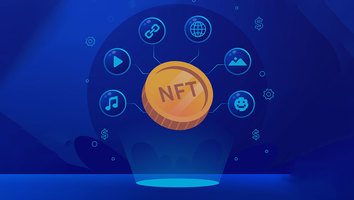As technology advances, businesses are increasingly employing it to improve efficiency, reduce costs and create new opportunities.
Among several emerging technologies, Big Data and Blockchain are becoming conventional among organizations that are employing them independently.
Statistical details of Blockchain
It is important to understand blockchain technology. To put it in simple words, it is a technology that is used to record and track transactions, as well as the assets in a business network, on a shared ledger.
Blockchain technology is one of a kind, as it is a process to analyze, identify, and cluster data on the blockchain which is a public cryptographic distributed ledger.
The reports clearly show that, in the past few years, there has been an increase in blockchain-based technologies. The global blockchain market size in 2019 was valued at $2.89 billion and is projected to reach a value of $137.39 billion by 2027 while growing from 2020 to 2027 at a CAGR of 62.7%.
Data Analytics and its Relation with Blockchain
Data Analytics is a process that analyzes the raw data to extract knowledge and insights from structured as well as unstructured data while making use of machine learning and other methods used for analyzing the data. The relationship between blockchain and data science has been well-researched and it has been found that the common link between these two technologies is that they both have data at the center.
Both technologies make use of algorithms to interact with other data segments, and to put it in a nutshell, it can be said that blockchain is used for data integrity, while data science is used for predictions.
Impact of Blockchain on The Data Analytics Industry
There is no doubt that both technologies go hand-in-hand, but slowly and steadily, blockchain is providing a boost to its market value.
Although both technologies have their own pros and cons, the benefits of blockchain continue to enhance data science.
Data based on blockchain is much better, more structured, and vast, and can be used for further analysis. At the same time, data generated from data science can easily be secured using blockchain technology and its network architecture.
While taking a closer look at both technologies, it is noticed that blockchain is impacting the data analytics industry, as it is enhancing data science. Some of the benefits and how blockchain is impacting the data analytics industry include:
Smooth and Easy sharing of data
An organization always looks for a smooth, easy, and quick flow of data for better functioning, as managing data on paper is a tedious and unmanageable job.
Blockchain technology is completely supporting organizations when it comes to data flow and access. Data can be easily viewed, accessed, and transferred in real-time, making it possible for more users to access it simultaneously.
This smooth, easy, and quick data flow, with no restrictions, completely streamlines the administrative process.
Data Traceability is enabled
Blockchain has made peer-to-peer relationships possible, as it enables users to trace data via means of ledger transparent channels from the point of entry to exit.
For instance, if one account is unable to explain the published methodology, then the other peer can easily view it and analyze and review the methodology from start to finish to understand how the results were achieved.
The user can experience the benefit of getting to know which data is reliable for use, where it comes from, and how it can be stored, updated, and used.
Data Accuracy is well maintained
Data accuracy is the biggest benefit of blockchain, and this is why blockchain data is stored in both private and public nodes. The data is well examined and cross-checked at the entry point itself only, before adding to the other blocks. This whole process itself is a data verification process.
Making Real-Time Analysis Possible
It is noticed that real-time data analysis is a difficult task, but Blockchain technology has managed to help companies by allowing them to analyze data in real-time in a skilled manner.
This is helping companies to identify irregularities at an early stage. Blockchain technology helps two or more users to work on the same information at the same time, similar to a spreadsheet feature where changes can be made and accessed by multiple users in real-time.
Improvement of Data Integrity
In the past few years, it has been observed that improving the data storage capacity has been highly challenging and organizations have been very meticulous about data authenticity.
By 2018, the technologies managed to overcome this challenge while the challenge to protect and verify the integrity of data was still pending. When data were sourced from various sources, they were prone to errors, copy issues, and inaccuracies.
It was Blockchain technology that became the relieving technology, as it ensured the authenticity of the data at every block of the chain.
Data verification and cross-checking are done at every block with multiple signatures on decentralized ledger records, and if the exact match for the signature is not found at every step, access is denied. This helps reduce the possibility of data hacking and leaks to a great extent. This is why organizations are adopting blockchain technology due to its immutable security.
Security aspects of Blockchain benefiting Data Science
A few security aspects of blockchain that are beneficial for data science and are worth mentioning include:
Data Lakes
It is seen that organizations usually store details in data lakes, but Blockchain makes use of the source of the data to record it in a specific block, along with a cryptographic key that is very specific. It is having the right key of the data source origin that ensures complete accuracy, quality, and genuineness of the data.
Encoded Transactions
While utilizing mathematical algorithms, it is the blockchain that encrypts every transaction in the ledger. This acts as an irreversible and immutable digital contract among the parties.
To Conclude!
The importance of blockchain analytics and the use of this technology is continuously increasing in the industry. Organizations are thankful for blockchain technology, as having transparent access to ledger transactions with immutable data is no longer a struggle.
This technology has been well accepted by industries such as digital finance, weapon tracking, healthcare, and food safety, while other industries are also planning to adopt it soon.



